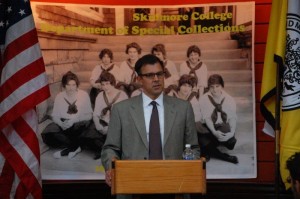On Sunday, December 7, and Monday, December 8, at the Alexander Hamilton Institute for the Study of Western Civilization (AHI), students, fellows, guests, and community members welcomed Skidmore College Associate Professor of Government Flagg Taylor for two searching discussions of the meaning of totalitarianism, both in its historical development and its incarnation in the former Czechoslovakia, a region to which he has traveled. Readings for discussion included his interview with former dissident Pavel Bratinka, published in the Winter 2012 issue of In the Public Interest, and a forthcoming review essay, “On Czech Dissent.” The Bratinka interview especially generated intense discussion during the dinner.
On Sunday evening, during a Leadership Dinner with Hamilton College students and AHI fellows, Dr. Taylor began with a review of life in Czechoslovakia under the totalitarian Soviet regime. The “high Stalinist” period of show trials and purges in the 1950s gave way to the “thaw,” or what the Communist Party called “normalization,” in the 1960s. It was a period of less violence, but “lifeless bureaucratic totalitarianism.” The emergence of Vaclev Havel’s Charter 77 and the (Vaclev) Benda Family’s campaign for the Defense of the Unjustly Persecuted followed.
The desire for free discussion of ideas remained even under a system that tried to repress the human spirit, creativity, and freedom. The humanities and social sciences were neglected in the communist education system, but dissidents employed creative methods to form “parallel institutions”: they gathered in each other’s apartments to discuss books and perform plays. Determined writers used the self-publishing method of samizdat to bypass censors and spread ideas. Dr. Taylor praised the former dissidents for their courage and willingness to talk about their experiences. They are very forthcoming and friendly to scholars, including students, doing research, he said.
“Two passages from the Bratinka interview,” observed AHI Charter fellow Robert Paquette, “resonated in particular with all the participants at the dinner. First, in explaining the longevity of totalitarian regimes, Bratinka underscored that the absence of hope matters more than the fear of pain. ‘
On Monday evening, Dr. David Frisk’s continuing education class “Modern Statesmanship and Leadership,” which has attracted a wide variety of informed adults from the region, was treated to a guest lecture by Dr. Taylor, as well. His talk on the “remarkable transformation” of Eastern and Central European countries after the Soviet takeover fit into the discussion of assigned readings on General Douglas MacArthur, German Chancellor Konrad Adenauer, and British Prime Minister Winston Churchill.
Dr. Taylor reminded the class that Victory Day meant something different for those consigned to live under the Iron Curtain. Stalin had no grand strategy because of the communist belief in the historical inevitability of world communism, but the Soviets managed to transform a diverse region into a politically monolithic, and oppressive, bloc.
It was a takeover that began well before the end of World War II and operated on various fronts: the monopoly of police and security forces, who were usually recruited from the uneducated class (by 1945, there were 20,000 functionaries in Poland alone); the takeover of cultural institutions, such as artists groups and youth groups; the takeover of the media, especially radio; control of electoral politics, often through deception about openness to other parties; control of economics, such as the confiscation and redistribution of land, the nationalization of heavy industry, and the burdening of businesses with regulations; and lastly, ethnic cleansing, such as the mass expulsion of ethnic Germans.
A revisionist view of this period of totalitarianism among historians emerged in 1959. Soviet repression was blamed on what were deemed Western “imperialist” efforts, such as the Marshall Plan. In Dr. Taylor’s opinion this revisionist history is “almost wholly false.” On both occasions, Dr. Taylor’s remarks inspired lively discussions about the human spirit and desire for freedom, even under the most challenging circumstances. Participants asked questions and related current events, such as threats by Vladimir Putin to former Soviet satellites, renewed propaganda campaigns, and intolerance of dissenting views on college campuses.
Dr. Taylor’s The Great Lie: Classic and Recent Appraisals of Ideology and Totalitarianism (ISI Press), a collection of works by Aleksandr Solzhenitsyn, Vaclez Havel, Leo Strauss and other major, and less well-known, but important, thinkers, is available at the AHI Bookshelf.


Leave A Comment